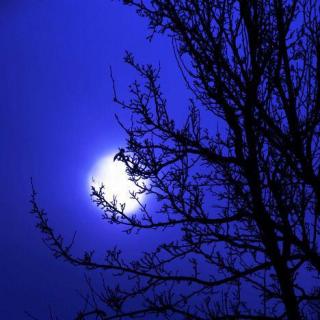
介绍:
作者简介:
彼得•斯坦哈特(Peter Steinhart),美国自然主义作家、艺术家,曾连续12年担任美国《奥杜邦杂志》(Audubon Magazine)的编辑和专栏作家。该杂志是美国国内影响力极大的群众性环保组织——奥杜邦协会出版发行的一份杂志,该协会致力于促进鸟类学研究。彼得•斯坦哈特的文章多次出现在《纽约时报》(the New York Times)和《洛杉矶时报》(the Los Angeles Times)等多家报刊杂志上。他还曾两次入围美国国家杂志奖(National Magazine Award)。他的散文清新隽永,给人以美的享受。
Spell of the Rising Moon
By Peter Steinhart
There is a hill near my home that I often climb at night. The noise of the city is a far-off murmur. In the hush of dark I share the cheerfulness of crickets and the confidence of owls. But it is the drama of the moonrise that I come to see. For that restores in me a quiet and clarity that the city spends too freely.
From this hill I have watched many moons rise. Each one had its own mood. There have been broad, confident harvest moons in autumn; shy, misty moons in spring; lonely, white winter moons rising into the utter silence of an ink-black sky and smoke-smudged orange moons over the dry fields of summer. Each, like fine music, excited my heart and then calmed my soul.
Moongazing is an ancient art. To prehistoric hunters the moon overhead was as unerring as heart-beat. They knew that every 29 days it became full-bellied and brilliant, then sickened and died, and then was reborn. They knew the waxing moon appeared larger and higher overhead after each succeeding sunset. They knew the waning moon rose later each night until it vanished in the sunrise. To have understood the moon’s patterns from experience must have been a profound thing.
But we, who live indoors , have lost contact with the moon. The glare of street lights and the dust of pollution veil the night sky. Though men have walked on the moon, it grows less familiar. Few of us can say what time the moon will rise tonight.
Still, it tugs at our minds. If we unexpectedly encounter the full moon, huge and yellow over the horizon, we are helpless but to stare back at its commanding presence. And the moon has gifts to bestow upon those who watch.
I learned about its gifts one July evening in the mountains. My car had mysteriously stalled, and I was stranded and alone. The sun had set, and I was watching what seemed to be the bright-orange glow of a forest fire beyond a ridge to the east. Suddenly, the ridge itself seemed to burst into flame. Then, the rising moon, huge and red and grotesquely misshapen by the dust and sweat of the summer atmosphere, loomed up out of the woods.
Distorted thus by the hot breath of earth, the moon seemed ill-tempered and imperfect. Dogs at nearby farmhouse barked nervously, as if this strange light had wakened evil spirits in the weeds.
But as the moon lifted off the ridge it gathered firmness and authority. Its complexion changed from red, to orange, to gold, to impassive yellow. It seemed to draw light out of the darkening earth, for as it rose, the hills and valleys below grew dimmer. By the time the moon stood clear of the horizon, full-chested and round and of the colour of ivory, the valleys were deep shadows in the landscape. The dogs, reassured that this was the familiar moon, stopped barking. And all at once I felt a confidence and joy close to laughter.
The drama took an hour. Moonrise is slow and serried with subtleties. To watch it, we must slip into an older, more patient sense of time. To watch the moon move inflexibly higher is to find an unusual stillness within ourselves. Our imaginations become aware of the vast distance of space, the immensity of the earth and the huge improbability of our own existence. We feel small but privileged.
Moonlight shows us none of life’s harder edges. Hillsides seem silken and silvery, the oceans still and blue in its light. In moonlight we become less calculating, more drawn to our feelings.
And odd things happen in such moments. On that July night, I watched the moon for an hour or two, and then got back into the car, turned the key in the ignition and heard the engine start, just as mysteriously as it had stalled a few hours earlier. I drove down the mountains with the moon on my shoulder and peace in my heart.
I return often to the rising moon. I am drawn especially when events crowd ease and clarity of vision into a small corner of my life. This happens often in the fall. Then I go to my hill and await the hunter’s moon, enormous and gold over the horizon, filling the night with vision.
An owl swoops from the ridgetop, noiseless but bright as flame. A cricket shrills in the grass. I think of poets and musicians. Of Beethoven’s “Moonlight Sonata” and of Shakespeare, whose Lorenzo declaims in The Merchant of Venice, “How sweet the moonlight sleeps upon this bank!/ Here will we sit and let the sounds of music/ Creep in our ears.” I wonder if their verse and music, like the music of crickets, are in some way voices of the moon. With such thoughts, my citified confusions melt into the quiet of the night.
Lovers and poets find deeper meaning at night. We are all apt to pose deeper questions about our origins and destinies. We indulge in riddles, rather than in the impersonal geometries that govern the daylit world. We become philosophers and mystics.
At moonrise, as we slow our minds to the pace of the heavens, enchantment steals over us. We open the vents of feeling and exercise parts of our minds that reason locks away by day. We hear, across the distance, murmurs of ancient hunters and see anew the visions of poets and lovers of long ago.
配乐,贝多芬《月光奏鸣曲》(理查德克莱德曼演奏)
部分中译文:
月升魅无穷
在我家的附近有座小山, 我常在晚间爬上山去。此时,城市的喧嚣成了遥远的低语。在这黑夜的静谧中,我尽情地分享蟋蟀的欢乐,感受猫头鹰的自信。不过,我上山是来看月出的,因为这可以让我的内心重新感到被城市消耗殆尽的平静与清新。
在这座山上,我欣赏过许多次月亮升起的景象。每一次月的姿容性情都不同。秋天,满月如轮,充满自信;春天,月亮清雾迷蒙羞羞答答;冬天,银白色的月亮挂在漆黑的、悄无声息的夜空中,显得那样孤寂;夏天,桔黄色的月似被烟尘笼罩,俯瞰干燥的田野。每一种月亮,都像美妙的音乐,颤动我的心灵,令我的灵魂平静。
但我们这些深居室内的人,已与月亮失去了联系。城市中耀眼的街灯和污染性烟尘遮住了夜空。虽然人类已在月亮上行走过,但月亮对我们却更加陌生了。现在已很少有人能说出今晚月亮何时升起。
但无论怎样,月亮依然打动我们的心灵。
如果我们偶然遇见一轮黄灿灿的满月高高挂在空中, 我们都会禁不住抬头凝望她那高贵的仪容。而月亮会向那些注视她的人赐予厚礼。
我得到她的厚礼是在山间七月的一个夜晚。我的车突然无缘无故地熄了火,将我孤身一人困在山中,束手无策。太阳已经落山,我注视着东边山头涌起的一团桔红色的明光,好像森林起火一般。突然,山头自己也似乎燃起火焰,一会儿,一轮又大又红的月亮从树林中慢慢现出身来,夏天空气中弥漫的灰尘与湿气令它显得异常怪异。大地灼热的呼吸扭曲了它,它变得非常暴躁,不再完美。附近农舍的狗紧张地狂吠起来,因为这团奇怪的光亮叫醒了野草中的魔鬼。
然而当月亮缓缓从山头升起,它聚集了越来越多的坚定与威严;它的面孔由红色变成了桔红,又变成金色,最后成为沉静的黄色。它似乎吸收了正在渐渐转暗的大地的光亮,因为随着它的升起,下面的丘陵山谷变得愈来愈朦胧。等到皓月当空,满月如盘,闪烁出象牙般的清辉,山谷便成了风景中一片幽深的阴影。那些狗明白了那团光原来是他们熟悉的月亮,也安定下来,停止了吠叫。霎时间,我也觉得信心倍增,心情舒畅,几乎笑了起来。
这奇特的景观持续了一个小时。月出是缓慢而充满神奇的。观看月出,我们必须回到一种古老的、耐心的时间观念中去。观看月亮不可阻挡地升上天空,会让我们找到内心的无比安宁,我们的想象力能让我们看到宇宙的辽阔和大地的广袤,能让我们忘掉自己的存在。我们觉得自身渺小,但又深感大自然的厚待。
月色下,我们看不到生活中坚硬的棱角。山坡在月光下如同笼上了一层柔和的银纱;大海在月光下宁静碧蓝;我们在月光下也不再像白日那般心计来往,而是沉醉于自然的情感中。
大家还在听

